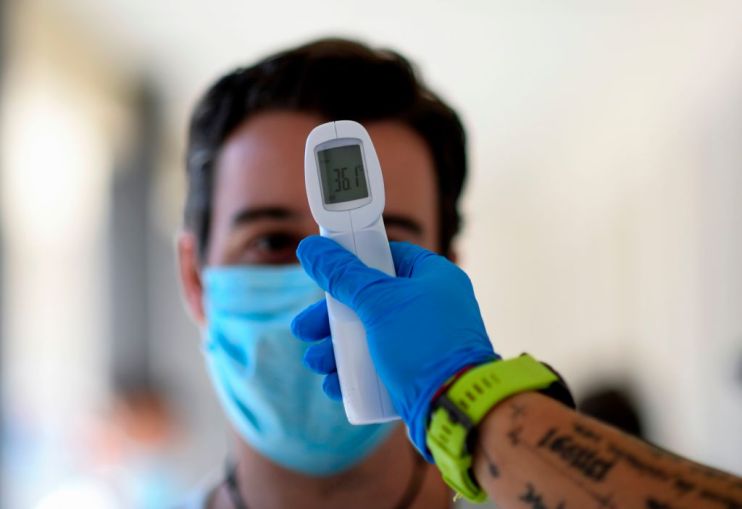Pandemic hysteria is blinding us to the virus’s real risks

I have long held off writing this column, as I well know it will lead to some hysterical responses. Nevertheless, the credo of any good opinion writer surely must be to be fearless, to fly in the face of received opinion if the cause is just.
And there has rarely been a greater need for a column, outlining how perfectly understandable caution about the Coronavirus—the political risk event of our generation—has morphed into something truly dangerous to the continued wellbeing of the West’s long-term economic and social health.
As a historian, I guarantee you our grandchildren will be set an exam question that goes like this: “In 2020, following the first peak of the Coronavirus, why did the western world turn its back on statistics, instead continuing to cower down in their homes, even after the huge economic and social dangers to such a course of action became clear?” At present, there simply is no rational answer to this fundamental question.
This Covid hysteria is peculiar to our time and place. Regarding the US, the Asian Flu of 1957 and the Hong Kong flu of 1968-69 were roughly equal to Covid-19 in terms of their lethality; in both cases well over 100,000 Americans died. However, it is highly unlikely you know much about either incident, as in neither did the US close itself economically for business. In both cases, the all-too-real economic risk was factored in, and America’s leaders responsibly thought in aggregate, all the while knowing that tragic deaths could not be abolished, that risk was an indispensable part of life.
Instead, our present western governments have now exaggerated the long-term health risks of Covid, while entirely underestimating the fearful economic price paid for a lockdown without end.
Lockdown was first rightly proposed at the height of the pandemic, an entirely sensible tactic to lessen the burden on hard pressed health care services: “To flatten the curve”. This has somehow morphed into a crazy, utopian desire to abolish risk and death itself, even as it made the advent of a horrendous economic depression far more likely.
Obsessing about one major problem, policymakers have criminally failed to foresee the predictable coming of another, as much of the west has not been working full-time for the past six months.
Indeed, the curve was flattened at great economic cost. But now, the policy rationale has entirely changed, as the numbers make it clear that lockdown no longer makes a shred of sense. And, as I learned to my horror over the American intervention in Iraq, when the rationale for any given policy changes, it probably means the policy is no longer a very good idea. Lockdowns were put in place to delay and spread out the inevitable infections, not to magically do away with them.
Here are the hard numbers. The odds of someone my age surviving the Coronavirus assuming I contract it are 997 out of 1000. That is not nothing, but as with the real risks from dying from a car crash or slipping in the shower, I’ll take my chances and keep traveling and continue to clean myself.
In aggregate, and this is how societies must work, the risk is manageable, statistics must be understood and the mad notion that all risk can somehow be abolished in life must be shouted down as the lunacy it is.
But the economic calamity this policy madness has caused is irrefutable. There are still more than 10.6m Americans out of work in August than there were in the golden days of February, ahead of the lockdown.
UK GDP toppled a subterranean 20.4 per cent in the second quarter; in 2020, British GDP erased 17 years of UK growth in just two quarters. During the same quarter, according to the Economist, Spain’s GDP fell 18.5 per cent, France 13.8 per cent, Italy 12.4 per cent, Canada 12 per cent, Germany 10.1 per cent, the US 9.5 per cent, and Japan 7.8 per cent. To blithely think we can all keep sitting on our couches while the economic apocalypse approaches, is the greatest danger of all.
At the same time, does anyone alive buy the nonsense that children have actually been learning anything even as their fragile skill sets erode? This unmeasurable cost will cripple generations.
So let’s not believe the panic mongers, as they are the greatest danger of all. As of the end of August, Covid cases remain high though the number of deaths and serious cases have plummeted, a fact that has been given shockingly little publicity. For example, patients on ventilators in the UK have declined from 3000 cases at the height of the pandemic, to merely 70 cases now, even as the case numbers have risen. Facts, as they say, are the facts.
The bottom line about the virus is as stark as it is vital. In Vietnam terms, we must not destroy the village in order to save it. After fruitlessly trying to mitigate risk forever through lockdown, we must now get back to work and save our civilisation.
Main image credit: Getty